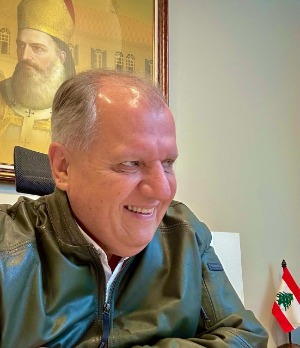Antoun el-Fata, "Akhbar al-Yawm"
Christians in the Middle East Struggle with Identity and Strategy...Other Minorities Shape Their Future
Douaihy: Disasters with a high cost to their future in Lebanon and the Middle East
All regional minorities are shaping their destiny without hesitation, clearly voicing what they accept and reject for their future in light of current global shifts—before major settlements take shape. Meanwhile, Christians remain "asleep" in conferences, electoral deadlines, positions, and their accompanying promises, instead of staying vigilant and alert to ensure that the next hundred years are not defined at their expense.
The president of the "Lebanese Land Movement," Talal Douaihy, clarified that "conferences addressing Christian affairs—such as the one recently held in Hungary—serve primarily as social platforms for networking and gaining insight into the Christian situation in the Middle East, rather than anything more substantial".

In an interview with "Akhbar Al-Yawm" agency, he explained that "Christians in Syria and Iraq lack a clear authority, leadership, or prominent figures, which is a stark contrast to the situation in Lebanon. However, the broader issue for Christians in the Middle East is their perception of themselves as a refined European-style society. That said, there is a fundamental difference between the realities in Lebanon and other Arab countries. In Lebanon, Christians believe that as long as the legitimacy of the state, the army, and the presidency remains intact, their position is secure".
Douaihy pointed out that "the Christian community possesses significant talent, with a wealth of engineers, lawyers, doctors, and professional associations, both in Lebanon and across the region. For instance, in Egypt, Copts contribute to 46% of the national economy. Moreover, Christians dominate key and sensitive sectors, including banking, hospitality, manufacturing, and the gold and diamond trade, among others. However, the Christian mindset is inherently inclined toward disengagement—even from itself, its own community, and its surroundings. This presents a fundamental challenge that impacts the broader Christian reality".
He further noted that "the political fragmentation and rivalries among Christian parties render the community ineffective in shaping the political landscape. Even the Maronite, Catholic, and Orthodox religious authorities have not managed to fill the void left by Christian political parties and figures in maintaining a strong presence on the ground or among the people".
Douaihy cautioned that "Christians' deep immersion in a life of luxury and comfort, their complacency in the face of challenges, and their disregard for the struggles of less privileged Christian communities place them on a precarious path toward an uncertain future. Excessive indulgence, detachment from reality, and a narrow focus on wealth, economy, tourism, and leisure have come at the expense of their political, institutional, and societal presence. Instead of confronting reality—as other ethnic and religious groups such as the Alawites, Druze, Sunnis, Shiites, and Kurds do—Christians risk paying a heavy price for their disengagement".
He further noted that "it is now rare to find young Christians engaged in skilled trades such as tiling, house painting, electrical work, or similar professions. In Christian mountain villages, even the harvesting of agricultural crops has become reliant on Syrian labor. This issue stems from a culture of excessive comfort and detachment from traditional livelihoods. Consequently, many Christians readily sell their land for non-essential reasons, whether to renovate home interiors, purchase luxury vehicles, or acquire high-end clothing. This culture of extravagance has even extended to Christian clergy, influencing both their lifestyles and rhetoric, trends that carry serious long-term consequences for the future of Christians in Lebanon and the Middle East".
Douaihy emphasized that "the current reality suggests that neither Christian religious leaders nor political figures are operating with a vision for the future of Christians in Lebanon. While the President of the Republic is elected under the premise that he represents all of Lebanon, the Prime Minister assumes office amid a perception that he primarily represents the Sunni community, and the Speaker of Parliament similarly acts as a leader for the Shiites. Likewise, Druze ministers often govern their ministries as if they were appointed to serve the Druze community specifically. This presents a major issue, as it is only the Christians who remain submissive and fearful, highlighting the urgent need for an electoral law that ensures fair representation for all groups".
He further stressed that "the Christian community lacks a cohesive strategy or ideology to guide it, instead prioritizing tourism, leisure, finance, banking, and an expensive education system that often extends to elite schools and universities, including institutions abroad".
Douaihy expressed regret that "the issue also affects the Vatican's handling of the Christian reality. For instance, there is no real distinction between the Vatican's ambassador and the ambassador of any other country, except for his attire. His speech mirrors that of any other foreign diplomat in Lebanon, and he fails to conduct the necessary and required oversight of the budgets and aid directed to Catholic institutions".
He concluded: "We don’t need a conference in Hungary to collect aid and funds for Christians when the wealth and accounts of Christian leaders abroad could easily cover the deficits in Christian hospitals and schools. These institutions are currently the greatest burden on the Christian community. Therefore, either we correct the Christian situation across all levels, or there is no hope left. The challenges are numerous, and Christians are now caught between the political Sunni and political Shia forces, along with imported ideologies that wage wars on Lebanese soil, destroying Lebanon without accountability, and then asking the state to rebuild once the fighting ceases".
Akhbar Al Yawm